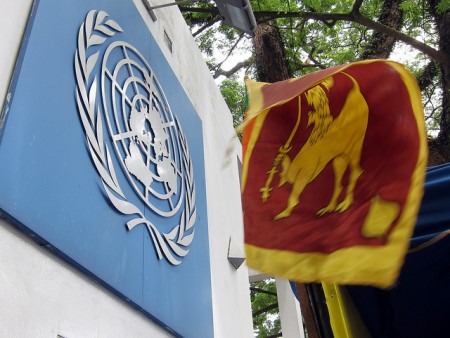
On 22 March, 2012, 24 countries voted in favour of a US resolution at a UN Human Rights Council meeting on Sri Lanka seeking to encourage the government to implement the recommendations made by the Lessons Learned and Reconciliation Commission (LLRC) and also to credibly investigate allegations of human rights violations during the country’s long lasting civil war against the LTTE.
The move was vehemently opposed by Sri Lanka right from the start and the netizens also voiced their opinions.
Dr. Dayan Jayatilleka at Groundviews called the US resolution a big lie:
“One of the rankest untruths in the public domain today is that the US resolution is innocuous and unobjectionable because it only seeks to commit the government of Sri Lanka to implement its own LLRC report within a reasonable time frame.”
Kalana Senaratne comments in another post:
“There is more ‘arrogance’ and ‘insensitivity’ than ‘concern’ written all over the haste with which the US is demanding the Sri Lankan Government to produce a ‘comprehensive action plan’ as regards the implementation of the LLRC’s recommendations.”
However Kalana also thinks that the Sri Lankan government needs to check its arrogance:
“What is astounding in much of what the Sri Lankan Government is doing is that it acts as if there is absolutely no link between a country’s domestic policies and its foreign policy. That is a fundamental mistake.”
Sri Lankan opposition, the Tamil diaspora and some human rights defenders were under fire from Sri Lankan nationalists as they supported the resolution. Activists Sunila Abeysekara, Nimalka Fernando and Dr. Paikiasothy Saravanamuttu had to publish a statement explaining their position.
Indrajit Samarajiva analyzed the draft resolution and commented:
“The logic here (in the UNHRC) and in too many places seems to be that the war was bad because Sri Lanka shouldn’t win. The effect of negotiating or fighting demurely with the LTTE would have been the continuation of the LTTE, which Prabhakaran literally continued until all his human shields escaped and he died.
In many ways, this type of resolution is a continuation of Prabhakaran’s terrorism, what I call Prabhakaran’s Play – using Tamil people as a human shield to reflect blame on the government of Sri Lanka and get international support to weaken them, and preserve his hide. It’s working, just years too late for the hide preservation.”
The blogger adds further:
“Real reconciliation doesn’t come from the UNHRC, or even the government. There is no punishment that leads to positivity. There is no one you can put in jail to make our problems go away. Reconciliation has to come from the people of Sri Lanka, and it is coming.”
And what does the resolution mean for Sri Lanka? Indrajit says in another post:
“Honestly, it’s like the international community is giving Sri Lanka homework where the answer is actually wrong. It’s not cool.”
This is a cross post from Global Voices.
For further information on the topic, check out the following articles:

